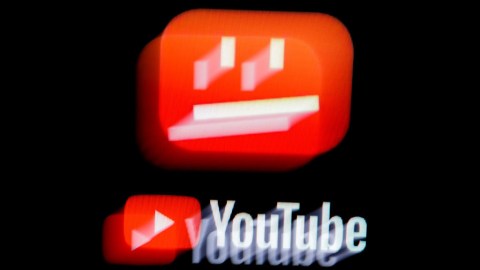YouTube sides with conservative Steven Crowder amid policy updates

Thomas Trutschel / Contributor
- Carlos Maza, a video creator for Vox who is gay, says right-wing commentator Steven Crowder has targeted him with racist and homophobic content.
- In a viral Twitter thread, Maza said YouTube is to blame for allowing content like Crowder’s.
- YouTube’s policies on hate speech and harassment have regularly changed, with updates as a recent as today (6/5/2019).
Since banning Alex Jones from its platform in 2018, YouTube has faced a barrage of criticism from right-leaning media figures who claim the company has silenced conservative voices. But on Wednesday, YouTube sided with a popular conservative channel accused of targeting a Vox video creator with racist, homophobic content.
The move begs the question: Where exactly is the line for YouTube’s terms of service?
Carlos Maza — co-host of the Vox YouTube channel Strikethrough — tweeted a thread last week outlining harassment he’s received in the wake of “rebuttal” videos from Steven Crowder, a popular conservative YouTube commentator. Crowder has risen to internet fame thanks in part to his popular “Change My Mind” videos, in which he debates issues like abortion and rape culture with passersby in public, usually on college campuses.
YouTube’s harassment and cyberbullying policy prohibits content that is “deliberately posted in order to humiliate someone, makes hurtful and negative personal comments about another person or incite others to harass or threaten individuals on or off YouTube.” According to YouTube, a days-long company investigation found that Crowder’s videos don’t violate this policy.
Google, which owns YouTube, elaborated on the decision in an email to USA Today. “Crowder has not instructed his viewers to harass Maza on YouTube or any other platform and the main point of these videos was not to harass or threaten, but rather to respond to the opinion,” the statement read.
Maza told USA Today that Crowder doesn’t need to explicitly “call on their supporters to dox someone.”
“They create an environment of targeted hostility and anger, and then play dumb when their supporters take action,” he told USA TODAY. “YouTube is catering to monsters who want to target LGBT creators while maintaining plausible deniability.”
Crowder disagreed. “This is corporate censorship,” he said in a YouTube video responding to Maza’s allegations. “This is a war. We will fight to the bitter end, both legally and publicly.”
On Wednesday, YouTube seemed to temporarily demonetize Crowder’s channel, at least until the channel removes a “link to his T-shirts,” presumably referring to shirts on the creator’s website that contain messages like “Socialism Is For F*gs.”
Where is the line for YouTube’s terms of service?
YouTube has been regularly issuing updates to its policies regarding cyberbullying, hate speech and harassment. In February, the platform issued new consequences for channels that publish content that brings “widespread harm” to the community. These punishments include demonetization, removal from Google Preferred lists, suspension, removal from Video Recommendations, and ineligibility to appear on trending lists.
On Wednesday, YouTube announced in a blog post that it will remove “videos alleging that a group is superior in order to justify discrimination, segregation or exclusion based on qualities like age, gender, race, caste, religion, sexual orientation or veteran status.” What’s more, YouTube said it has also banned videos promoting debunked conspiracy theories, such as denials of the Holocaust or the Sandy Hook shooting.
But YouTube also issued a policy update today that’s considerably more ambiguous: A stated desire to remove more “borderline content,” which the company defines as “content that comes right up to the line,” citing videos that promote flat-earth theories or pseudoscientific medical information as examples. Beyond that, what qualifies as borderline content is anyone’s guess.
In May, Neal Mohan, chief product officer at YouTube, spoke with Recode’s Peter Kafka about the difficulty of policing YouTube content while also trying to maintain a platform where diverse voices can be heard.
“That’s a combination of things, right? One is, does the video actually violate our policies?” said Mohan. “Are our policies drawn in the right way? We’re constantly looking at our policies, including our hate and harassment policies. The second part is are we detecting it quickly enough and are we having an enforcement action on it quickly enough? And so what I would say is that all three of those elements are evolving, and we’re not perfect,” he continued. “We get better every day, but we’re not perfect about them.”
One open question is: Can mob reaction tip the scales when YouTube is deciding what content is “borderline”?
It’s unclear what the ultimate result of the Maza-Crowder incident will be. But it’s likely that YouTube is paying attention to it — and taking some action — because Maza’s Twitter thread went viral and explicitly shames the company.





